Saint Leo’s First Civic Engagement Day Promotes Voting, Involvement
The university’s Why Vote? Campaign, Undergraduate Social Work Department, and Social Work Club hosted nonpartisan event to ‘empower, elevate, and educate’

The university’s Why Vote? Campaign, Undergraduate Social Work Department, and Social Work Club hosted nonpartisan event to ‘empower, elevate, and educate’

Helping others, creating change, and becoming involved in solving problems are all part of civic engagement, and on April 12, Saint Leo University recognized these crucial responsibilities at its first university Civic Engagement Day. With a theme of Empower, Elevate, and Educate!, the day’s activities and speakers were hosted by Saint Leo’s Why Vote? Campaign, Social Work Club, and the Undergraduate Social Work Department.
Members of nonpartisan community organizations, including the National Association of Social Workers-Florida Chapter (NASW-FL), the National Campus Vote Project, the Social Work Department, the Why Vote? Campaign, State Representative Susan Valdés, (Hillsborough County), candidates for office, and others spoke with students, faculty, staff, and members of the public on the importance of civic engagement, the impact of civic engagement and voting, and how students can make a difference in the upcoming 2024 election.
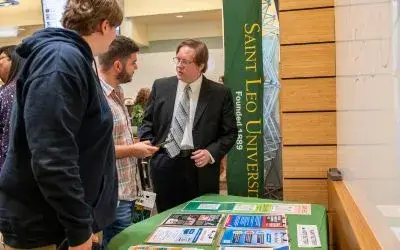
Saint Leo social work students and the university’s Why Vote? Campaign were recognized in March for being No. 1 in the nation in the VOT-ER student-led voter registration competition.
“In 2023, Saint Leo crushed it,” said Bianco Navarro, field director for the nonpartisan, nonprofit organization that integrates civic engagement into health care. The campaign was honored by VOT-ER at Saint Leo’s annual Influential Women in Social Work event.
The Why Vote? effort by the Saint Leo students resulted in 553 voter registrations in two months. “I’m in awe of this team,” said Reid Garnett of VOT-ER.
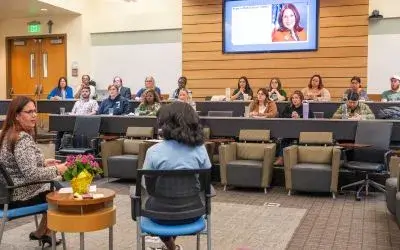
“For us, it's not just having students register; it is also about getting information about the changing laws regarding voter registration, voting by mail, and the voter signature law,” said Saint Leo senior social work major Kara Pinder. “Voter registration is also the first and most essential step to voting. It is your power as a citizen, and we should feel that we have the power to choose. We have seen many people feel discouraged and disinterested in voting because of the lack of trust in the media and candidates, but their vote does matter. There is power in numbers, and elections are voting in candidates that will represent us and our community. You are not only voting for yourself but for the community, family, and friends.”
Valdés, who represents the 64th House District, could not agree more. In an engaging question-and-answer session with senior social work student Yvenie Desrosiers, the state representative said in addition to registering, it is crucial to remind registered voters of new vote-by-mail laws. In Florida, everyone now must submit a new request to vote by mail each year. “You have to sign up again,” Valdés said.
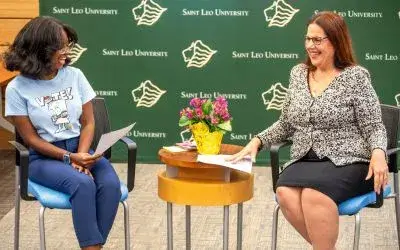
A request to receive a vote-by-mail ballot covers all elections from the date a request was submitted through the end of the calendar year for the next ensuing regularly scheduled general election.
“And vote in more than just the presidential election,” Valdés added. “Vote in every single election you can.”
“Down-ballot” elections also are important — not just the races for president, senators, and governor races. The local races and issues often are those that have the most impact on people, she said.
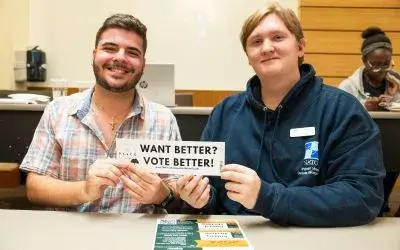
Derosiers asked Valdés what “civic engagement” means to her as well as how to build community and unity. “Helping families, getting involved in your community, knowing your neighbors, exercising your duty for voting,” the state representative said. She noted that while there are 84 Republicans and 36 Democrats in the Florida House, and 28 Republicans and 12 Democrats in the state Senate, “When you sit down and talk with your colleagues who aren’t as like-minded, it’s just amazing that we all just want the same things. We need to work together when we’re able.”
That also carries over to everything people do, she said. “When you go to the [cash] register and are being helped by someone and they don’t speak, say ‘hello,’” Valdés said. “Bring that humanity back. We forget how to see each other.”
Pinder tied the idea of civic engagement back to the practice of social work. “Social workers are a crucial profession when fighting against social injustices,” the graduating senior said. “Our profession was founded for the promotion of a better community. Social workers are constantly civically engaged as advocates for their clients and work within the macro, mezzo, and micro-practices.
“Macro social workers' jobs entail changing and repairing significant systemic issues affecting communities and cultures,” she continued. “Mezzo social workers focus on people in communities and organizations that experience challenges and how they can support their clients. Micro social workers help individuals, families, and small groups and help them access resources and navigate critical resources.”
What’s Next
Saint Leo’s first Civic Engagement Day drew not only Saint Leo students, but also social work students from the University of South Florida. The event was made possible by a grant that the Why Vote? Campaign received from the Students Learn Students Vote/Ask Every Student organizations.
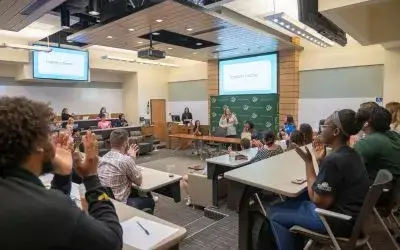
For the next academic year, the Why Vote? Campaign will coordinate events for civic “holidays,” including National Voter Education Day, Civic Engagement Week, and more. The group is creating a creating a university website focused on voting resources and working with orientation leaders to incorporate civic engagement into their programs.